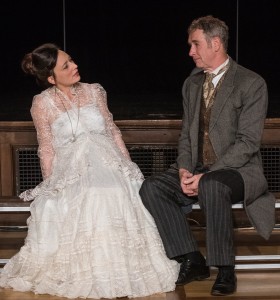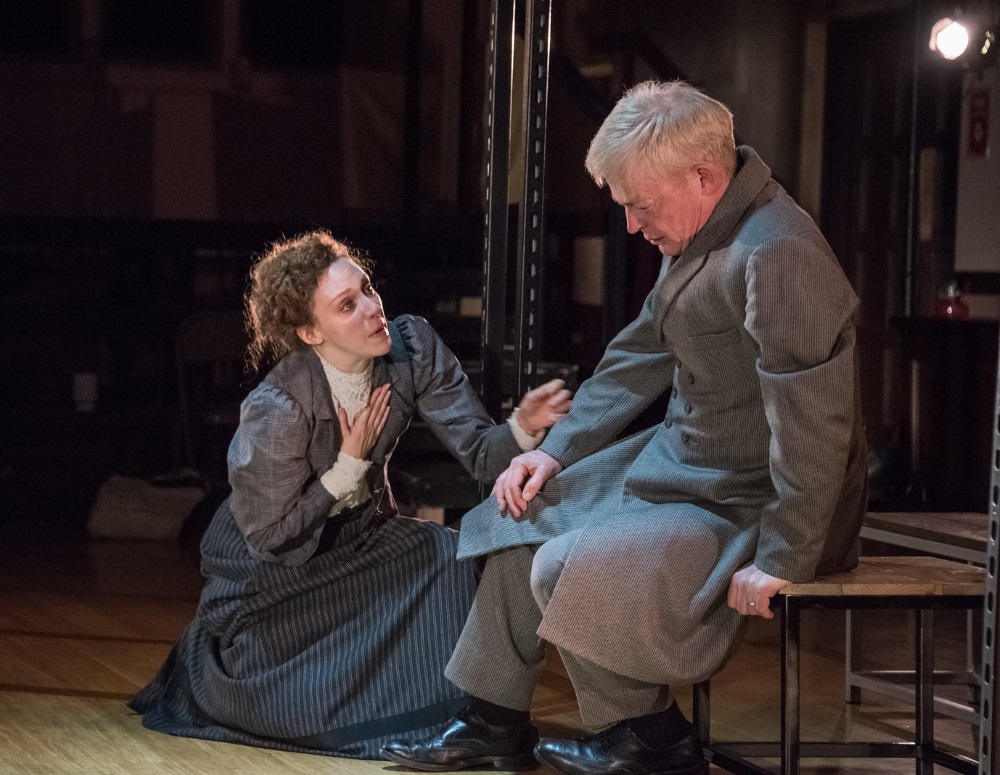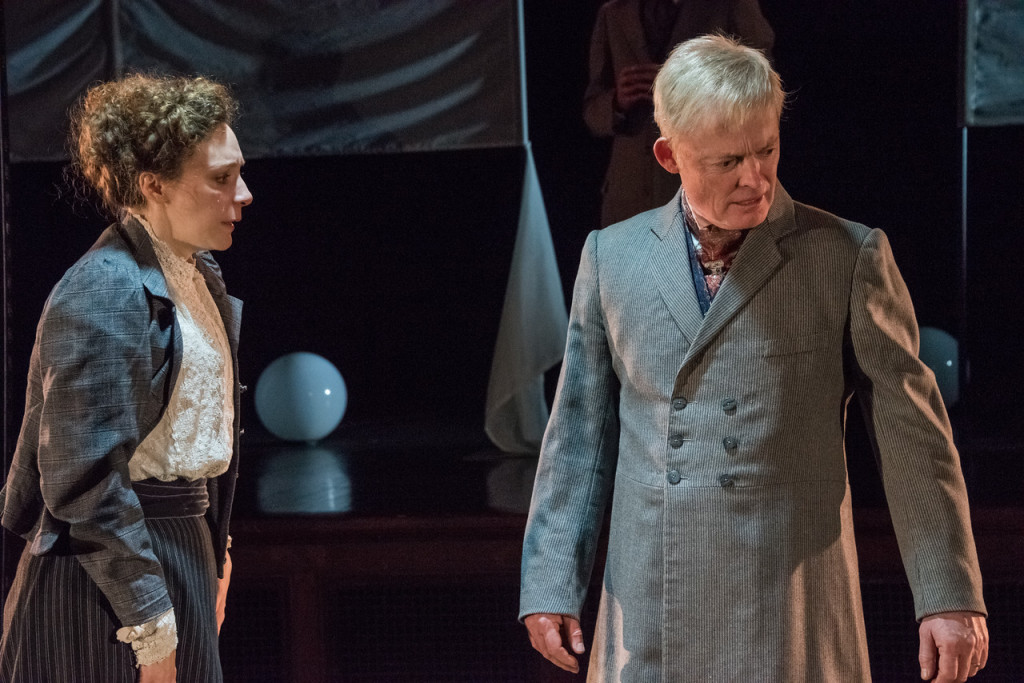A dozen years ago, Allyn Burrows co-founded the Actors’ Shakespeare Project in Boston, following several memorable seasons performing with Shakespeare & Company. Like Shakespeare’s own London troupe during its years between permanent playhouses, ASP is an itinerant company, creating temporary stages in various venues in and around Boston. Its current production, The Winter’s Tale, plays in Willet Hall in Brookline’s United Parish church through January 3rd. It’s a compact, engaging rendition of a notoriously challenging play that creates some problems for itself while shrewdly resolving others.
Another parallel to Shakespeare’s peripatetic company is this production’s small, multitasking cast. Eight actors, in semi-Edwardian dress, take on all the roles, including some doubling that might well have been the author’s intention.
The Winter’s Tale is part of the group  of plays known as the “late romances,” which also includes The Tempest, Cymbeline and Pericles, all of them revolving around themes of loss and renewal. Here, King Leontes of Sicilia loses everything (but his crown) to a false suspicion that the child his wife is carrying is not his but the secret spawn of his best friend. The play traces a wintry journey through a moral darkness of rage and remorse into a literal springtime of love, forgiveness and redemption – a play that begins like Othello but ends like All’s Well.
of plays known as the “late romances,” which also includes The Tempest, Cymbeline and Pericles, all of them revolving around themes of loss and renewal. Here, King Leontes of Sicilia loses everything (but his crown) to a false suspicion that the child his wife is carrying is not his but the secret spawn of his best friend. The play traces a wintry journey through a moral darkness of rage and remorse into a literal springtime of love, forgiveness and redemption – a play that begins like Othello but ends like All’s Well.
Unlike the Moor of Venice, though, the king of Sicilia needs no Iago to spur him to a senseless revenge. And there’s the rub – the first of two “problems” that nag at staging this play. Leontes’ jealousy comes out of nowhere. One minute he’s begging his friend Polixenes, king of Bohemia, to extend his visit in the court and urging his wife, Hermione, to make him stay, and the next minute – literally – he’s seized by a murderous passion that wishes them both dead.
I’ve never seen a Winter’s Tale that was able to really solve this puzzle, but Melia Bensussen’s production doesn’t even try. At one point, just before the tragic turn, when Allyn Burrows’ Leontes is urging his friend to remain and his wife to charm him into it, Polixenes has his hand on Hermione’s knee, their fingers intertwined, and Leontes doesn’t even notice.
This kind of missed opportunity makes things lax and rather ordinary at first. Burrows, too, takes some time to get up a head of steam, seeming in his suspicious asides more the actuary calculating an unexpected hazard than a man watching his happiness evaporate. Things don’t really heat up until Hermione’s trial for adultery and its aftermath, when Leontes’ world collapses as suddenly as his jealousy arose.
The second challenge in The Winter’s Tale is its abrupt shift in time, mood and locale, from the gray gloom of Sicilia to sunny, festive Bohemia 16 years later. Where most productions fill the stage with colorful garlands and dancing peasants, this scaled-down version merely adds a pair of white streamers to designer Cristina Todesco’s austere centerpiece – a gazebo constructed of steel pillars – and artfully condenses the sheep-shearing festival to its intimate basics.
In this section Burrows becomes, much more effectively, the flinty old shepherd who has rescued and reared Perdita, the baby daughter Leontes thought he had condemned to death. Another nifty double act comes from Jesse Hinson, who’s both a sober-sided Camillo, the king’s most upright counselor, and a goofy, gullible young shepherd.
 In the latter guise he supplies the play’s comical moments, along with Steven Barkhimer as Autolycus, the countryside con man. The pair execute a giddy pocket-picking routine so thorough that the young dupe ends up in his undies. Barkhimer also provides a couple of musical interludes and in the early scenes plays the old courtier who famously exits “pursued by a bear.” That perennial production challenge is neatly solved with help from lighting designer John Malinowsky. Not so the problem, without a child in the cast, of little prince Mamillius, whom Barkhimer also plays in a suspension-of-disbelief gambit that doesn’t really work.
In the latter guise he supplies the play’s comical moments, along with Steven Barkhimer as Autolycus, the countryside con man. The pair execute a giddy pocket-picking routine so thorough that the young dupe ends up in his undies. Barkhimer also provides a couple of musical interludes and in the early scenes plays the old courtier who famously exits “pursued by a bear.” That perennial production challenge is neatly solved with help from lighting designer John Malinowsky. Not so the problem, without a child in the cast, of little prince Mamillius, whom Barkhimer also plays in a suspension-of-disbelief gambit that doesn’t really work.
Nigel Gore brings another Shakespeare & Company connection to the production, as a longtime stalwart of the Lenox troupe. Here he’s Polixenes, baffled and angered first by Leontes’ unaccountable jealousy and then, back home in Bohemia, by his son Prince Florizel’s love for Perdita, a mere country wench. And in two cameo change-ups, he’s also a gruff jailer and a rugged seaman.
My impression is that Bensussen hasn’t applied a very strong directorial hand to this production, from the lackluster opening to some uneven performances. Austyn Davis, in her professional debut, has an affecting presence as an almost-silent handmaiden in the early scenes, but is surprisingly flat as Perdita – lovely and winsome, but without the lively spirit that would attract a prince. The same goes for Felix Teich, a gallant but unexciting Florizel.
The director has apparently left her leads largely to their own devices as well. As Hermione, ASP regular Mara Sidmore hits all the right notes, from graceful hostess to wounded queen to resurrected wife and mother, but never really surprises us with the woman’s transitions. In contrast, Marianna Bassham’s passionate, assured performance as Paulina, Hermione’s close friend and fiercest defender, anchors the first half’s climax and the finale’s revelations and reunions.
Hefty cuts to the text, especially in the second half, and some imaginative staging on the makeshift set keep things moving briskly through the storybook twists. As the earth spins through December darkness before turning again toward the light, this poignant winter’s tale reminds us that what’s lost can be found, and spring, however damaged or delayed, will come again.
Photos by Stratton McCrady
If you’d like to be notified of future posts, email StageStruck@crocker.com






